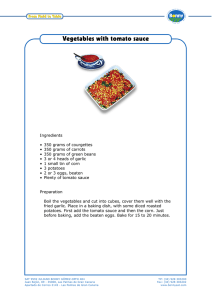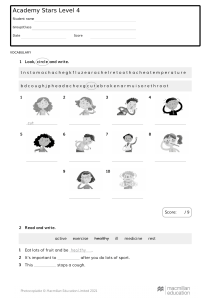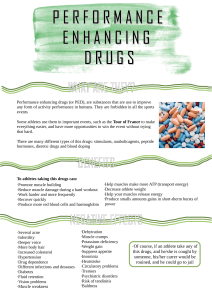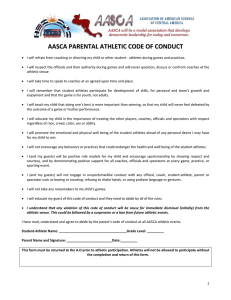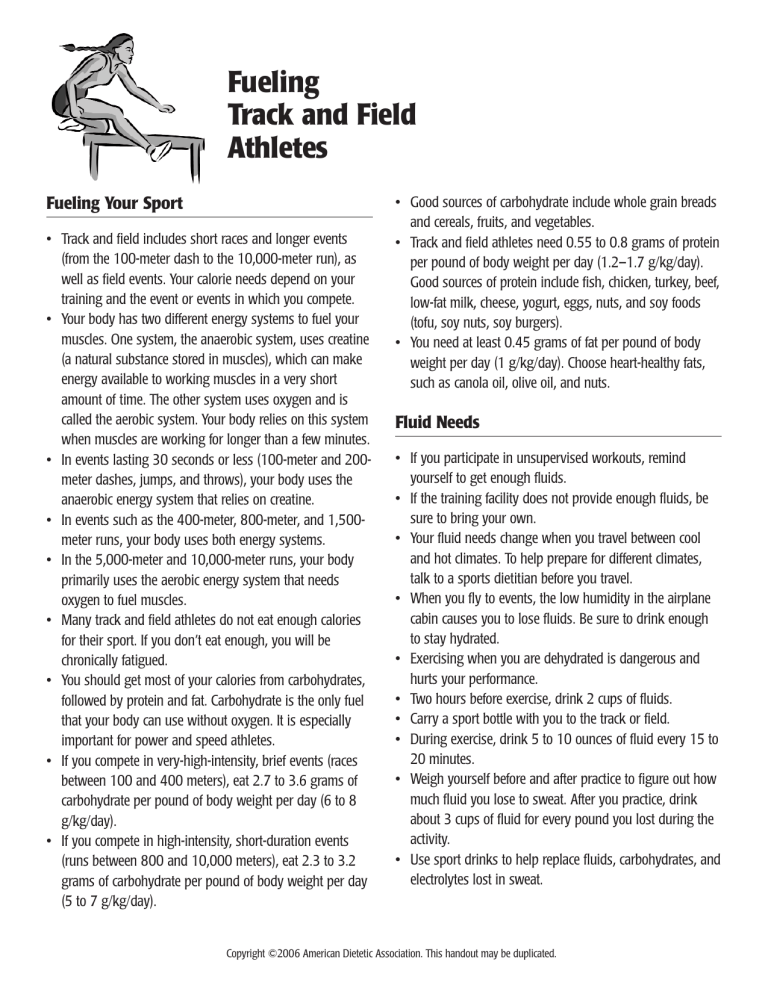
Fueling Track and Field Athletes Fueling Your Sport • Track and field includes short races and longer events (from the 100-meter dash to the 10,000-meter run), as well as field events. Your calorie needs depend on your training and the event or events in which you compete. • Your body has two different energy systems to fuel your muscles. One system, the anaerobic system, uses creatine (a natural substance stored in muscles), which can make energy available to working muscles in a very short amount of time. The other system uses oxygen and is called the aerobic system. Your body relies on this system when muscles are working for longer than a few minutes. • In events lasting 30 seconds or less (100-meter and 200meter dashes, jumps, and throws), your body uses the anaerobic energy system that relies on creatine. • In events such as the 400-meter, 800-meter, and 1,500meter runs, your body uses both energy systems. • In the 5,000-meter and 10,000-meter runs, your body primarily uses the aerobic energy system that needs oxygen to fuel muscles. • Many track and field athletes do not eat enough calories for their sport. If you don’t eat enough, you will be chronically fatigued. • You should get most of your calories from carbohydrates, followed by protein and fat. Carbohydrate is the only fuel that your body can use without oxygen. It is especially important for power and speed athletes. • If you compete in very-high-intensity, brief events (races between 100 and 400 meters), eat 2.7 to 3.6 grams of carbohydrate per pound of body weight per day (6 to 8 g/kg/day). • If you compete in high-intensity, short-duration events (runs between 800 and 10,000 meters), eat 2.3 to 3.2 grams of carbohydrate per pound of body weight per day (5 to 7 g/kg/day). • Good sources of carbohydrate include whole grain breads and cereals, fruits, and vegetables. • Track and field athletes need 0.55 to 0.8 grams of protein per pound of body weight per day (1.2–1.7 g/kg/day). Good sources of protein include fish, chicken, turkey, beef, low-fat milk, cheese, yogurt, eggs, nuts, and soy foods (tofu, soy nuts, soy burgers). • You need at least 0.45 grams of fat per pound of body weight per day (1 g/kg/day). Choose heart-healthy fats, such as canola oil, olive oil, and nuts. Fluid Needs • If you participate in unsupervised workouts, remind yourself to get enough fluids. • If the training facility does not provide enough fluids, be sure to bring your own. • Your fluid needs change when you travel between cool and hot climates. To help prepare for different climates, talk to a sports dietitian before you travel. • When you fly to events, the low humidity in the airplane cabin causes you to lose fluids. Be sure to drink enough to stay hydrated. • Exercising when you are dehydrated is dangerous and hurts your performance. • Two hours before exercise, drink 2 cups of fluids. • Carry a sport bottle with you to the track or field. • During exercise, drink 5 to 10 ounces of fluid every 15 to 20 minutes. • Weigh yourself before and after practice to figure out how much fluid you lose to sweat. After you practice, drink about 3 cups of fluid for every pound you lost during the activity. • Use sport drinks to help replace fluids, carbohydrates, and electrolytes lost in sweat. Copyright ©2006 American Dietetic Association. This handout may be duplicated. Dietary Supplements Commonly Used by Track and Field Athletes Top Three Nutrition Tips to Improve Performance Creatine • Creatine supplementation may help athletes in highintensity, short-duration activities, such as sprints, and in field events like shot put, javelin, long jump, and triple jump. • Creatine may help you recover more quickly from weight training sessions, which could help you to train harder. • Creatine monohydrate powder is a common creatine supplement. The recommended dose is 3 to 5 grams per day. Taking more than that amount will not increase the benefits. • Creatine is not recommended for athletes younger than 18 years because it is not known whether it is safe for use in people in that age group. 1. Learn to eat well before, during, and after events. Track and field athletes may compete in multiple events over several hours. Heptathletes and decathletes compete in multiple events in 2 days. Plan to eat breakfast the day of a meet, and pack portable foods in your gym bag and snack between events. 2. Eat carbohydrates to refuel after training or competition. This will help you to prepare for the next day’s workouts or competition. Athletes who train several times a day and compete in multiple events should eat 0.7 grams of carbohydrate per pound of body weight (1.5 g/kg) within 30 minutes after exercise, and follow up over the next several hours with more carbohydrates. 3. Plan a fluid schedule and stick to it. Just as you train your muscles for sport, train your body to tolerate fluids. Remember to drink before you feel thirsty. Banned Supplements • Dietary supplements are not well regulated by the Food and Drug Administration (FDA). Supplements can be sold without any proof that they work or that they are safe. • Supplements labeled as “natural” can contain banned substances. • Sports’ governing bodies publish lists of banned substances, but they do not provide lists of specific supplement products that contain banned ingredients. • If you take a supplement and you are not aware that it contains a banned substance, you can still be punished by your sport’s governing body. A claim that you did not know a supplement contained a banned substance is not an accepted defense. • A sports dietitian can help you determine whether a supplement will help your performance, and whether taking it could affect your eligibility. Nutrition Prescription: ______ calories per day ______ grams of carbohydrate per day ______ grams of protein per day ______ grams of fat per day ______ cups of fluid per day Special concerns: Copyright ©2006 American Dietetic Association. This handout may be duplicated.

